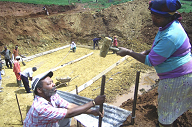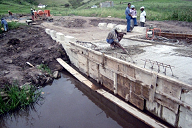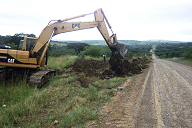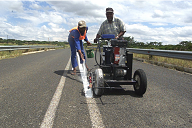|
KZN DoT Holds Vukuzakhe Indaba
Despite the fact that our Vukuzakhe programme has performed well over the past several years, we need to review our Vukuzakhe programme to ensure that emerging contractors benefit from the current boom in the construction sector, and from the new policy environment that government has developed in support of broad based black economic empowerment. Our departmental review of Vukuzakhe has taken the following concerns into consideration: When the Vukuzakhe programme first started contractors were restricted to the construction and maintenance of our gravel road network. Today, largely through the African Renaissance Roads Upgrading Programme (ARRUP), contractors are gaining experience through constructing highly sophisticated blacktop roads, bridges and drainage systems.
(Top) Vukuzakhe contractors engaged in the construction of
structures on the provincial road network Contractors are only too well aware of the fact that a movement from gravel road to blacktop road contracts entails a shift from more labour intensive methodologies to capital intensive methodologies. Plant requirements for constructing blacktop roads are of a much higher order in terms of value and sophistication than those required for gravel roads. So much so that for an emerging contractor to compete effectively for contracts to construct blacktop roads, he/she must have accumulated plant to the value of some R4,6 million. If R4,6 million worth of plant were financed through bank loans it would require a monthly instalment of R141 000. Our Vukuzakhe programme was initiated when the construction industry in South Africa was still in serious recession. During the recession many of the very large companies either:
Today the construction sector in South Africa is booming. So much so that the Johannesburg Stock Exchange Construction and Building Materials Index has gained more than 63% over the past year. For the past several years our construction sector has grown at a much faster rate than that of the South African economy. None of us need reminding that we are only beginning to prepare for the 2010 Soccer World Cup and that South Africa is bidding against Japan and New Zealand to host the 2011 Rugby World Cup. In KwaZulu-Natal an already booming construction industry will be further boosted by projects such as the Dube Trade Port, the construction of the King Shaka airport and the John Ross Highway. In less than ten years therefore the construction sector in South Africa has moved from doom to boom. We must obviously now plan for the future of our emerging contractors within an industry that is attracting more and more influential role players. In the first years of Vukuzakhe the Department provided contracts within a closed database system. This limited the number of contractors on the database and ensured that each company was well known to the Department and that there was no fronting. The re-opening of the Vukuzakhe database increased our register to almost 25 000 contractors. In recent years we have become aware of some instances of fronting within Vukuzakhe. This was raised at the 2005 Departmental Summit held at Ulundi earlier this year as an issue that must be addressed urgently. The department will not tolerate fronting on any of our programmes Ė it will be rooted out and the guilty parties will be harshly dealt with. On the question of allegations of corruption generally, ways of separating corrupt activities from legally accepted practices are being investigated. For example, the department will be re-looking at the policy regarding the trading of public servants. We will ensure that our monitoring systems improve qualitatively rather than quantitatively in order to ensure that the targeted audiences do benefit from these programmes. These then are some of the more compelling reasons that challenge us to review our Vukuzakhe programme. In charting the way forward we need to acknowledge that we are building on very solid foundations. There are not many broad based black economic empowerment programmes in South Africa that can boast the same record as Vukuzakhe. Some of the achievements of our Vukuzakhe programme since 1998 include:
|



